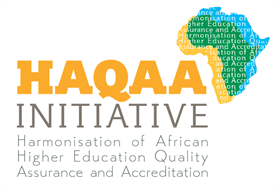Read this in: Arabic
The HAQAA Initiative, funded by the European Union in partnership with the African Union, has been established to support the development of a harmonised quality assurance and accreditation system at institutional level, national, regional and Pan-African continental level. Between 2015 and 2018, the Initiative has been implemented by a consortium consisting of the University of Barcelona (coordinator), the Association of African Universities (AAU), the European University Association (EUA), the European Association for Quality Assurance in Higher Education (ENQA) and the German Academic Exchange Service (DAAD). Activities have engaged important African regional and national organisations and networks active in the field.
Harmonisation of higher education through the Joint Africa-EU Strategy
The global objective of the work on higher education in the framework of the Joint Africa EU Strategy is to contribute and support the harmonisation of higher education programmes and the creation of a revitalised, distinctive, attractive and globally competitive African higher education space, through enhanced intra-African collaboration.
The quality assurance and accreditation experience undertaken in Europe through the Bologna Process and the on-going work with African universities testify to the interest and benefits linked to the portability of qualifications. A number of key challenges for quality and accreditation and possible way forward have been identified by stakeholders at the Exploring Quality Assurance through the Africa-EU Partnership Conference in Libreville, Gabon in May 2013 and at the African Higher Education Harmonisation and Tuning Workshop on credits and the portability of qualifications in Brussels in March 2014. In the Roadmap 2014-2017 as adopted by the 4th EU-Africa Summit this is further underlined.
An International Conference of States was convened in Addis Ababa, Ethiopia, on 12 December 2014 to examine and adopt revisions to the 1981 Regional Convention on the Recognition of Studies, Certificates, Diplomas, Degrees and other Academic Qualifications in Higher Education in the African Region. Consequently, the African Union Commission is working jointly with UNESCO to facilitate the ratification of the Addis Ababa Convention (Addis Convention).
Parallel work on the development of a continental Quality Assurance and Accreditation Framework has been underway with the EU financing a study on a Pan-African Quality Assurance and Accreditation Framework (PAQAF) which was finalised after a thorough consultation process and validated at a continental workshop in Accra, Ghana in July 2015.
This has resulted in an AU Executive Council Decision on developing the Pan-African Quality Assurance and Accreditation Framework (PAQAF). The African Union Commission is the champion of this process, in collaboration with the European Union, which is supporting two harmonisation initiatives – The HAQAA Initiative and TUNING AFRICA.
These initiatives aim to support institutional cultures of quality, the development of compatible accreditation mechanisms, build capacity amongst quality assurance and accreditation bodies and establish renewed degree programmes, common teaching and learning methods, credits and assessment tools, and joint agreements between universities.
What is PAQAF?
‘PAQAF’- The Pan-African Quality Assurance and Accreditation Framework, which the AUC has had endorsed via its committees and its Council, is an overriding framework for a number of commitments related to quality assurance activities in Africa. The implementation of the Addis Convention and AQRM are part of it, as are commitments to develop African Standards and Guidelines for Quality Assurance, an African Credit Transfer System and a continental register for quality assurance agencies and national bodies. As many aspects of PAQAF have not yet been developed, the HAQAA Initiative is seen as a means to contribute to it its implementation.
For a comparison of the ASG-QA and the African Quality Rating Mechanism, two PAQAF tools, please click here.


